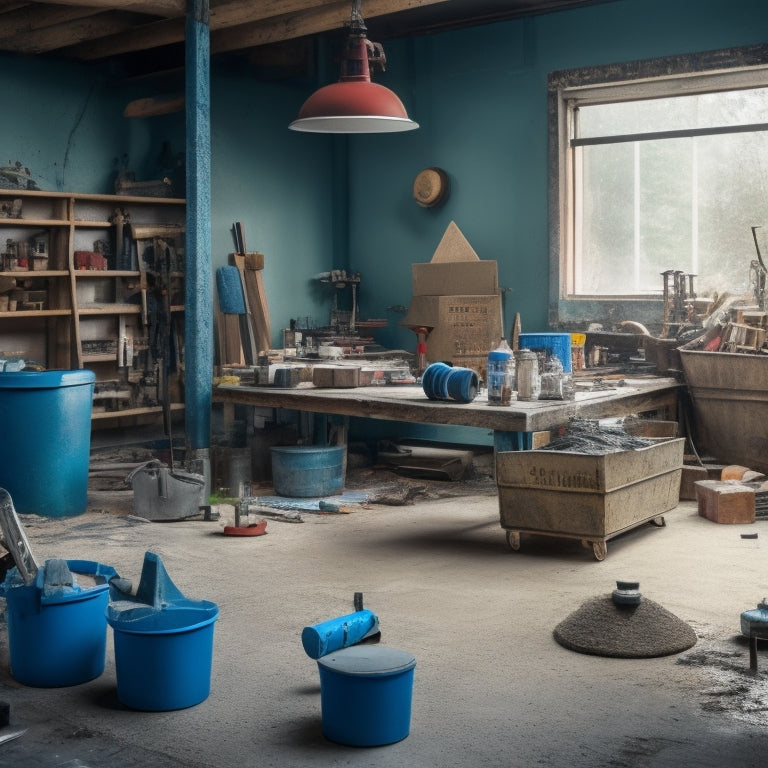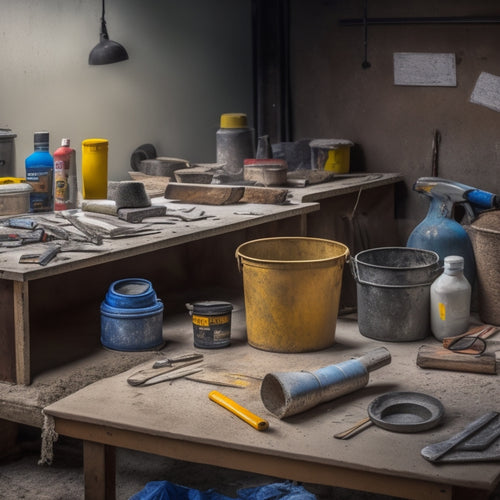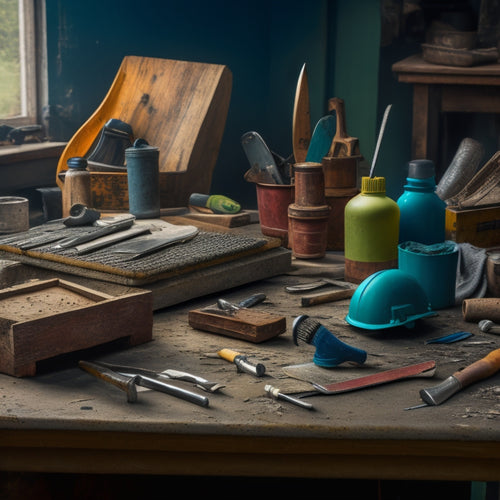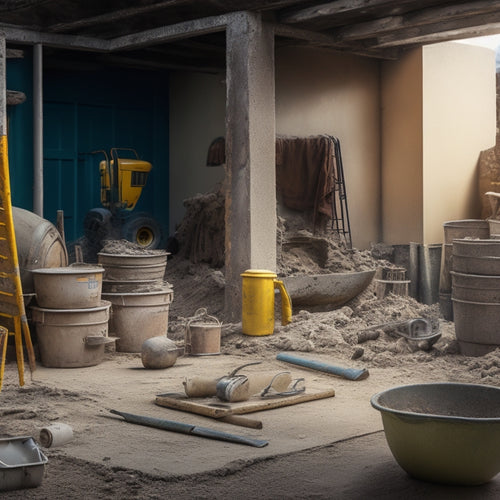
What Tools Do Concrete Layers Need
Share
You'll need a thorough set of tools to guarantee your concrete projects turn out strong, durable, and visually appealing. Essentials include hand tools like trowels, levels, and jointers for precise block laying, as well as power tools like rotary hammer drills, concrete mixers, and power trowels for efficiency. Don't forget safety gear like hard hats, safety glasses, and steel-toed boots to protect yourself on site. Additionally, you'll need measuring and testing equipment like laser levels and slump test kits to guarantee accuracy. With the right tools, you'll be well on your way to achieving professional results - and that's just the foundation.
Key Takeaways
• Concrete layers require essential hand tools like trowels, levels, and jointers to ensure precise block laying and finishing.
• Power tools such as rotary hammer drills, concrete mixers, and power trowels are necessary for efficient and effective concrete work.
• Safety gear like hard hats, safety glasses, and steel-toed boots are crucial to protect concrete layers from injuries and hazards.
• Measuring and testing equipment, including laser levels and slump test kits, help ensure accurate concrete mixes and surface finishes.
• Specialized tools like quality trowels, edgers, and jointers are necessary for achieving professional-looking finishes and precise joints.
Essential Hand Tools for Block Laying
You'll need a solid set of hand tools to efficiently lay blocks, and these essentials will get you started. A sturdy trowel is a must-have for scooping and spreading mortar, ensuring a smooth, even layer.
A level and string line will help you achieve precision and accuracy in your block laying techniques. A jointer or pointing trowel is necessary for finishing and refining joints, while a spirit level and straightedge guarantee straight lines and perfect angles.
Don't forget a hawk or mortar holder to keep your mortar fresh and within reach. When it comes to mortar mixing, a mixing stick or tamping tool is crucial for achieving the right consistency. A rubber mallet is also handy for tapping blocks into place without damaging them.
With these hand tools in your arsenal, you'll be well-equipped to tackle any block laying project with confidence and precision. By mastering the basics of block laying techniques and mortar mixing, you'll be able to tackle complex projects with ease.
Must Have Power Tools for Concrete
Equipping yourself with the right power tools is vital for efficient and effective concrete laying, and a rotary hammer drill is a primary priority for any serious concrete professional. This powerful tool allows you to drill into concrete with ease, making it a must-have for any concrete project.
Next, you'll need a concrete mixer to prepare the perfect mix. A quality mixer guarantees consistent results, saving you time and hassle. Don't settle for a subpar mix that can compromise your entire project.
Another significant power tool is the power trowel. This tool helps you achieve a smooth, even finish, which is essential for a professional-looking result. With a power trowel, you can work faster and more efficiently, getting the job done quickly and to a high standard.
Safety Gear for Concrete Layers
With your power tools in place, it's time to focus on protecting yourself from the hazards that come with working with concrete, and that starts with wearing the right safety gear. As a concrete layer, you're exposed to physical and chemical risks daily, so it's vital to prioritize your safety.
Here are the essential safety gear you should have:
| Safety Gear | Purpose | Type |
| Hard Hat | Protects from falling objects | ANSI-compliant |
| Safety Glasses | Shields eyes from debris and chemicals | Anti-fog, impact-resistant |
| Steel-Toed Boots | Prevents foot injuries | Slip-resistant, waterproof |
| Gloves | Protects hands from cuts and abrasions | Durable, grip-enhancing |
| Respirator | Filters out airborne particles | NIOSH-approved, fit-tested |
Measuring and Testing Equipment
Accurate measurements and thorough testing are essential to guaranteeing your concrete projects meet specifications, so you need reliable measuring and testing equipment to get the job done. You can't afford to compromise on precision, and the right tools will help you achieve consistent results.
Here are some must-haves in your measuring and testing arsenal:
-
Laser level: guarantees your surfaces are perfectly level and plumb, ensuring a professional finish.
-
Slump test kit: measures the consistency and workability of fresh concrete, helping you identify potential issues before they become major problems.
-
Concrete thermometer: accurately monitors temperature, which is critical for proper curing and strength development.
- Vibrating table or screed: helps eliminate air pockets and guarantees a smooth, even finish.
With these tools, you'll be able to tackle any concrete project with confidence, knowing your measurements are spot-on and your materials are tested to perfection.
Specialized Tools for Finishing Touches
You're ready to add the finishing touches to your concrete project, and that's where specialized tools come in, helping you achieve a flawless, professional-looking finish. As you work on perfecting your surface textures, you'll need a range of specialized tools to get the job done.
A good quality trowel is essential for applying and smoothing out concrete. Mastering trowel techniques takes practice, but with the right tool, you'll be able to achieve a smooth, even finish.
Other specialized tools you'll need include edgers, jointers, and float blades. Edgers help you create clean, defined edges, while jointers allow you to create precise joints and seams. Float blades are used to smooth out the surface of the concrete, removing any imperfections or air pockets.
Frequently Asked Questions
Can I Use Homemade Concrete Mixes for Large-Scale Projects?
When you're considering using homemade concrete mixes for large-scale projects, think twice.
While it might seem cost-effective, you'll likely sacrifice consistency and quality.
Homemade mixes can be prone to variations in strength, texture, and color, which can lead to structural issues and aesthetic problems.
For large-scale projects, it's better to opt for commercial mixes that guarantee uniformity and reliability, ensuring your project stands the test of time.
How Do I Handle and Store Leftover Concrete After a Job?
As you stand victorious on the freshly poured concrete battlefield, you're left with a lingering question: what to do with the leftover concrete?
Don't let it go to waste like a fallen soldier. Instead, you'll need solid storage solutions to keep it fresh for the next mission.
Seal it tightly in airtight containers or buckets, and store them in a dry, protected area.
This way, you'll be ready to deploy it at a moment's notice, like a well-oiled machine.
Are There Any Eco-Friendly Alternatives to Traditional Concrete?
You're looking for eco-friendly alternatives to traditional concrete? You're on the right track!
Sustainable materials and green technologies are changing the game. Consider using recycled aggregate, fly ash, or slag cement to reduce your carbon footprint.
You can also explore hempcrete, a plant-based alternative that's gaining popularity.
These options not only benefit the environment but also offer unique benefits like improved durability and thermal performance.
Start exploring and find the perfect fit for your next project!
Can I Reuse Concrete Forms and Molds for Future Projects?
'Ha! You think you can just reuse those concrete forms and molds like they're your favorite coffee mug? Think again!
Form maintenance is key, and mold durability isn't infinite. You'll need to clean and store them properly to guarantee they're good as new for your next project.
Don't risk compromising your concrete's integrity - take the time to care for your forms and molds, and they'll pay you back with smooth, flawless pours.'
What Is the Typical Career Path for a Concrete Layer?
As you start your career as a concrete layer, you'll likely begin as an apprentice or laborer, learning the basics from experienced pros.
From there, you'll progress to journeyman, taking on more responsibility and refining your skills.
With continued skill development, you can move up to foreman or supervisor, overseeing projects and mentoring others.
Your career progression will depend on your dedication to learning and adaptability - the more you grow, the more you'll earn.
Conclusion
You've got the skills, now it's time to gear up!
Think of your tools as a master chef's ingredients - without them, you can't whip up a concrete masterpiece.
From essential hand tools to must-have power tools, safety gear, measuring equipment, and specialized finishing tools, having the right arsenal is key to a successful concrete project.
With these tools in your belt, you'll be laying concrete like a pro in no time, building a solid foundation for your career.
Related Posts
-

3 Best Tools to Buy for Concrete Repair Online
When buying tools for concrete repair online, you'll want to research multiple retailer options to find the best prod...
-

Must-Have Handheld Tools for Concrete Repair
When tackling a concrete repair project, it is crucial to have the right handheld tools to achieve a professional fin...
-

What Tools Are Needed for Concrete Wall Foundations
You'll need a thorough array of tools and equipment to construct a concrete wall foundation that meets structural int...


